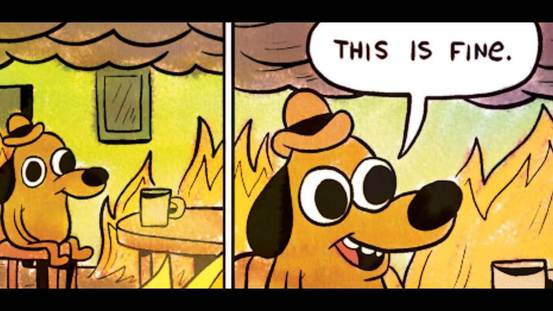|
| Everyone loves 'fast and easy' when buying things. The downside is that it doesn't always translate to 'Great Service'. GET YOURSELF A ‘GO-TO' PERSON. Ideally it's the same person each time because explaining myself multiple times to new people is a special kind of awful for me. I find real value in ‘knowing someone to call' when I have a problem...and with all else being equal I'll take service and relationship every time. | "Why yes. I'd love to hold. thanks." |
CLAIMS GUIDANCE.
A good broker should be able to work with you throughout a claim.
They can:
- Help with documentation and getting things started right.
- Retrieve answers when things aren’t moving quickly.
- Set expectations and explain things as they are happening.
- Keep an eye out for what's best for YOU on renewal and going forward.
'Lawyering up' right away on a denied claim and dealing with it all yourself can take years off your life mentally not to mention draining you financially.
Last but not least.
SUPPORT SMALL BUSINESS.
Supporting small businesses feels good and creates local jobs.
Multinational Conglomerates are great... but if you can support someone in the community that'd be my preference.
-MD
Home. Auto. Life. Travel....whatever.
I could think of hundreds of things I'd rather spend $3,000 a year on.
2. Buy new grass each year and never take care of it knowing more is coming next year.
3. Unlimited Ice Cream and Milkshake Budget.
4. Donate it. (had to offer up SOMETHING that wasn't totally self indulgent)
This could go on, but I think you see where I'm going here.
GET VALUE.
Make sure the money you spend is MAXIMIZING your personal enjoyment of this otherwise disappointing expense.
They shop for new carriers every year, they don’t mind waiting on hold forever, and they have zero interest in getting to know the people offering that product.
THE VALUE FOR THEM is about feeling like they got the VERY LOWEST PRICE AVAILABLE.
If you're this type of customer....consider a direct insurer.
There are lots of them out there catering exactly to what you're looking for. (TD, UNIFUND aka JOHNSON, Sonnet, etc)
The model is setup so that the insurers save costs on selling it (using call centers) and then pass some of those savings to the customer through lower premiums.
ALL UPSIDE right? Not necessarily.
There's usually a TRADE OFF.
No different than buying a home without a realtor. Super idea until you find out the house is built on a swamp. Since you're actually risking more to buy direct it makes sense the price should be lower.
If you have a claim that goes sideways hopefully you've banked some of that money you've saved on premiums to hire a lawyer.
If lowest price was the only thing people VALUED the market would be FLOODED with Kirkland Basketball Shoes and Big 8 Jeans...yet I can't find Big 8 Jeans anywhere.
VALUE can be lots of things...
especially with items you can't un-box.
- Accessibility (quick to reply to emails/text/phone calls?)
- Familiarity (Do I have the same people every time? Does it feel like my business is valued here?)
- Transparency (Do they explain things to me? Do I know what I have, or why I have it?)
- Capability (Do I feel like this person knows anything about insurance? Am I getting good advice?)
- Dependability (Is this person going to be here when I have a problem? Do they know anything about claims?)
- Support for Local Business (Local brokerages SHOULD provide local jobs)
VALUE for MANY is a combination of a number of things.
A reasonable price is absolutely a factor.
Most Nova Scotia residents are not in a position to completely ignore price...nor should they. Those insurance bills are going to keep rolling in...and most of us are going to keep paying them so why not feel better about the payment by getting some VALUE out of the transaction.
It’s out there…just figure out what it means to you and look for that.
-MD
What's a good deductible for my insurance?
2 Deductibles - 1 Policy
Consider Auto Insurance being split into collision and comprehensive deductibles.
What's WORTH KNOWING NOW - Is how this has made it's way into both HOME INSURANCE and COMMERCIAL PROPERTY INSURANCE.
In some cases they may remove or limit coverage on certain types of damage altogether. Ex. Vandalism by tenants.
The reasoning
1) decrease the number of small claims being made.
2) ease the pressure of yearly premium increases.
3) make policyholders care more about AVOIDING losses altogether.
Advice
Some carriers offer GREAT price breaks for certain deductibles, and way less of a break on the next level up.
That carrier may offer you $850 a year for a $1000 deductible.
(that's a solid price break if you're wondering)
Then $800 a year for a $2,500 deductible.
2) Be comfortable paying the amount of a deductible if you need to.
3) Minimize the cost of coverage by figuring out what risk you're willing to carry.
CLAIM SCENARIO - Deductibles in action
Policyholder 1 loses their $6,000 engagement ring while taking a ride on the Halifax Harbour Hopper. Lucikly they listened to a broker who helped them purchase a policy that included 'mysterious disappearance'.
$6,000 ring
Maximum jewelry limit is $5,000.
LESS the $1,000 deductible = $4,000.
.....but that'd be incorrect.
$6,000 ring
- Deductible (1000)
= $5,000
In this case, policyholder 1 would get a $5,000 payout.
About the author
Matt Davison is a |
Categories
All
Auto Accidents
AUTO INSURANCE
Auto Insurance Rates Explained
Back To School
Brokers
Cancellation
Claims
Deductibles
Flood Coverage
Home And Auto Insurance Advice
Home Insurance
IBAC
IBANS
Ice Damming
Landlord
Non Payment
PROPERTY INSURANCE
Rental Property
Replacement Value
TELEMATICS
Tenant Insurance
The Role Of A Broker
Archives
January 2024
May 2023
February 2023
March 2021
February 2021
June 2020
October 2019
September 2019
June 2019
March 2019
February 2019
January 2019
October 2018
August 2018
June 2018
May 2018





 RSS Feed
RSS Feed


